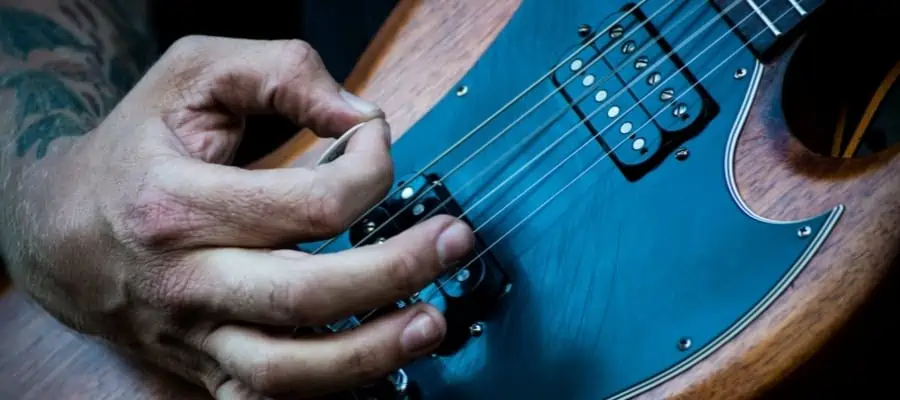As a guitar player, there’s nothing worse than trying to create a smooth, warm melody only to hear that clashing, metallic sound from your pick hitting the strings. Unfortunately, all picks are bound to make some noise; however, when those chirps, scrapes, and clicks become too much to handle, we’re all left wondering: “Why does my guitar pick make so much noise?”
Potential reasons why your guitar pick is making excessive noise include holding it at an awkward angle, squeezing it too tightly, using the wrong model, practicing poor pick technique, playing with a particularly old or worn-out pick, and not cleaning your equipment frequently enough.
Below, I’ll go over some potential reasons why your pick makes so much noise, along with an in-depth explanation. At the end of this read, I’ll also explore some practical, quick solutions you can try to make your picks quieter, so make sure to read on until the end.
Potential Reasons Why Your Guitar Pick Is Making Too Much Noise

Overly Thin Pick
A pick that’s too thin or flexible can make it difficult to control your movements, thus leading to harsh sound. When you take a flimsy material and slide it across sturdy, good-quality strings, chances are that the material will experience more pressure than the strings themselves.
That’s why it is no surprise that, in this instance, the pick will start flailing around, hitting random strings and other components, overpowering even the sound you’re trying to create. So, consider using a slightly thicker or sturdier model to control and minimize all that excess noise.
Note, however, that going too far off in the other extreme can do more harm than good.
Overly Thick Pick
Using a pick that’s too thick can have a similar effect, only this time, the noise will be even louder.
Since these models tend to be harder and less flexible than their thinner counterparts, they still don’t interact ideally with the strings, hitting them at awkward angles and coming in contact with other parts of the instruments. As a result, you’ll experience an overwhelming noise that can notably impact your performance.
That’s why it’s best to experiment with picks of different thicknesses to find one perfect for you.
Aggressive Technique
An aggressive technique will create excess noise since hitting the strings too hard will produce a harsh, abrasive tone.
Though some genres require dynamic and high-energy movements (think metal or hard rock), there’s still no reason for you to get too aggressive with your technique – a gentler touch will always get the job done just right.
Poor Technique
Those who haven’t perfected their technical abilities yet are bound to hit the strings at an awkward angle at one point or another. Unfortunately, doing so can cause unwanted noise and a scratchy, unpleasant tone.
So, take the time to practice and work on your technique, and until then, try your best to hold your pick at a straight angle when striking the strings.
Worn-down or Damaged Pick
When you use a pick long enough, scratches, indentations, and other structural flaws are bound to appear on its surface. As a result, when you try playing with it, you’ll notice that it makes excessive noise and creates an inconsistent tone.
Picks are meticulously designed and shaped to give you the best performance. You can’t expect the same performance and accuracy when their shape and structural integrity deteriorate.
Dirty Strings or Pick
You’d be surprised at how dirty your guitar and all its accessories can get, especially if you play regularly. Think about it – all those oils and bacteria that collect in your hands will transfer into your equipment.
However, while we wash our hands regularly enough for these impurities to avoid becoming a problem, we rarely think about cleaning our strings and picks as often as we should. As a result, residue and contaminants build up, leading to unwanted noise and a dull, muted tone.
How To Prevent Excessive Noise From Your Guitar Pick

Luckily, there are some steps you can take to prevent all of that excessive noise from your guitar pick. Here are some of them:
- Play with a different pick. As mentioned above, models in both extremes can lead to unwanted noise, so opting for a pick of a moderate size and overall thickness might help you achieve a better playing experience.
- Work on your technique. Even the best-quality pick in the world can still produce unpleasant sounds if you don’t use it right. So, work on your technique to perfect your movement patterns and try your best to hit the strings at a straight angle. Moreover, try experimenting with a gentler touch if you tend to favor a more aggressive playing style.
- Clean your pick and guitar strings regularly. To prevent all that oil and residue buildup from affecting your playing experience, you’ll want to clean your strings and picks regularly, preferably wiping them off after every session.
- Replace your strings regularly. Even when you take excellent care of your strings, time is bound to wear them down eventually. So, remember to replace them at least once every few months (or after they’ve reached 100 hours of use).
- Use a noise gate pedal. This can help reduce unwanted noise by cutting off the sound when the signal falls below a certain threshold.
Conclusion
Unfortunately, guitar pick noise is a common issue among guitar players; however, once it reaches excessive levels that affect your playing experience, you’ll want to get to the bottom of the problem and take the right precautionary measures.
All the above factors can contribute to unwanted noise and a degraded tone your pick produces. So, I recommend experimenting with different pick thicknesses, techniques, and maintenance schedules until you find out what works.
If you found this article useful, you may want to save this pin below to your Guitar board.

Recent Posts
When learning new songs have you noticed that some of the chord sequences sound really good? But when you tried to come up with your own chord sequence, or as we call it chord progression, you found...
Some guitarists insist on buying an expensive amplifier with their electric guitar. They assume that this is a must for every type of guitarist out there. However, in some situations, this isn’t...

